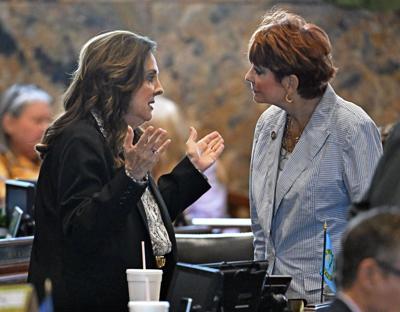Last year, the GOP-controlled Louisiana Legislature passed and Gov. Jeff Landry signed into law the during a special session focused on crime. After years of protecting youth offenders with confidentiality governed by the Louisiana Youth Criminal Code, Republicans decided that moving four years of juvenile court data into a single online system and requiring the online publication of court minute entries for children charged with violent crimes on or after Jan. 1, 2024, was the way to go.
All for the sake of transparency.
An , in 2023, would have forced youth offenders in Caddo, East Baton Rouge and Orleans parishes to be a part of a pilot program. The idea was dropped after youth activists and advocates pushed back on the effects in what are predominantly Black parishes.
It's important to watch what's happening in the Legislature during the sausage-making before the sausage is wrapped, packaged and distributed as law. The bill that led to moved through the Legislature, was refined, got pushback but made it through as a constitutional amendment that voters could approve or reject. It would have put more minors in adult courts and in adult prisons with longer sentences. But more than 66% of voters rejected the amendment.
It didn't have to get that far.
isn't exactly like Amendment 3, but it is worrisome.
Here's how the Power Coalition for Equity and Justice breaks down the two bills:
Last year's House Bill 1 aimed to publicize some juvenile court records, made certain juvenile records accessible to the public, and focused on youths accused of violent crimes and repeat offenders.
This year's would specifically make juvenile records part of a child's "criminal history," apply to all juvenile records, would share juvenile records more broadly across the justice system while calling that confidentiality and change some legal definitions without a new, confidential public access system.
I asked the bill's sponsor, state Rep. Debbie Villio, R-Kenner, about it.
" IS NOT a disclosure bill," she wrote in a text, capitalizing "is not." "It removes none of the guardrails in place regarding juvenile records. It allows the records to be maintained electronically. All parishes."
"The bill simply provides a complete and accurate picture of the individual in front of those authorized to have access to the information," she continued. "It does nothing more."
Child advocates don't see it that way.
Attorney Lauren Hall, a policy associate with the Louisiana Center for Children's Rights, said Villio's bill is a confidentiality jab. The way she and other child advocates see it, the Truth and Transparency law made violent youth crime cases more public, and this measure would target children with misdemeanors and nonviolent first offenses.
As I see it, we're not talking about adult offenders, we're not talking about violent youth offenders. We're not talking about children who have been accused of kidnapping, rape or murder. We're talking about children who might be charged with truancy, violating curfew and underage use of alcohol.
When Hill testified against the bill at the State Capitol in Baton Rouge, she made several points, including that the bill "threatens to take away the confidentiality that is an essential part of juvenile rehabilitation." Children accused of misdemeanors and have never been in trouble before would lose confidentiality protections, and the bill would "remove the provision explicitly excluding juvenile records from the adult criminal justice database," she said.
In addition, "This bill will not improve transparency. It will prevent children from getting jobs and successfully growing into early adulthood, if their records are accessible in the adult criminal justice database," she added.
Villio said people shouldn't "assume there's something nefarious in the proposed legislation." She told me one of her concerns is that adult court judges don't have a complete picture when they have youths in their courts, sometimes because a youth from one parish might have their case heard in a parish that doesn't have access to criminal history records. An updated electronic database would resolve that, she said. Or, in her words, "Maybe we should go back to stone documents carried by horses."
No, I don't think any of us want stone tablets, documents delivered by people on horseback or even by buses or trains. Though some might speed in a vehicle, delivery by automobiles or trucks wouldn't work well either. The right people need the right information at the right time, and a statewide electronic database for juvenile records sounds like a good idea.
I'm concerned about what might happen in the sausage-making, and I want to err on the side of protecting children.

















